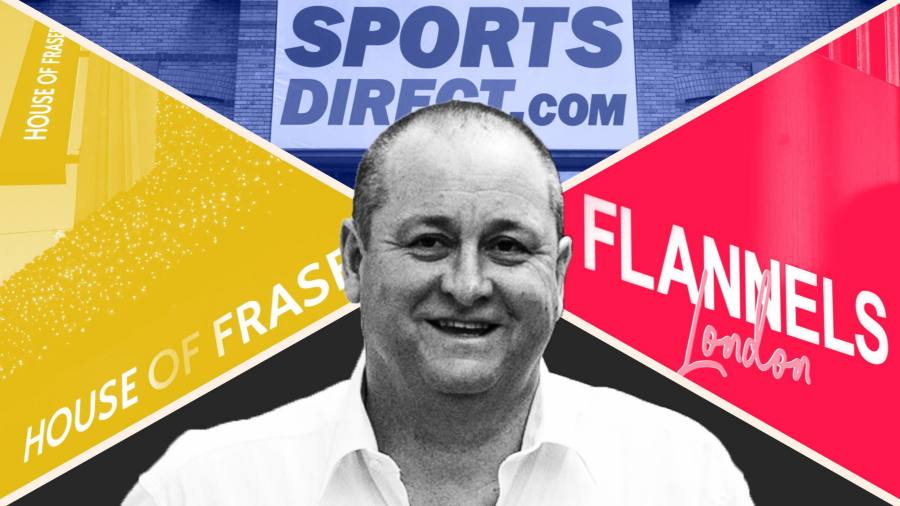
If retail is detail, then Mike Ashley was the consummate retailer. The Sports Direct founder, who steps down next month as director of the multibillion-pound conglomerate he built, cared far more for the intricacies of shops and warehouses than for share price or reputation.
Over four decades he turned Sports Direct — since rebranded as Frasers — from a single store in Berkshire to a FTSE 100 company with more than 1,500 stores worldwide and annual sales of £4.75bn.
“You’d organise a one-hour meeting with Mike and four hours later he would still be asking questions,” said one businessman who has had many dealings with him over the years.
“He was utterly fascinated with understanding how businesses worked.”
In the quarter-century that Sports Direct and its forerunner companies were private, that approach worked. Public scrutiny of the former squash player — an injury forced Ashley to give up the sport — was minimal.
By the end of the 1990s he had around 90 shops. Less than a decade later, helped by a few acquisitions, he had more than 400, plus a collection of sportswear brands — but still almost no public profile.
He told one newspaper toward the end of 2006 that he was “a private man running a private business” and did not seek the limelight.
But the following year, Ashley made two decisions that would catapult him on to both the front and back pages of newspapers.
One was his purchase of Newcastle United, a Premier League football club with a large following but a small trophy cabinet. The other was to float Sports Direct on the stock exchange.
“It’s fair to say they were completely naive about the workings of the City and what being a quoted company entailed,” said one person involved in the IPO. “But frankly they didn’t care. They wanted to do it on their terms.”
Sports Direct hired Merrill Lynch as bankers and installed respected former Whitbread finance director David Richardson as chair.
“People thought everything would be fine, that once they were listed they would mould to the City’s way of doing things. But they didn’t. They just carried on regardless.”
Among the usual boilerplate, the prospectus warned that “the interests of [Ashley] may conflict with those of the public shareholders”.
Investors who thought they were buying a conventional consumer stock were soon blindsided by a fall in profits and a penchant for acquiring small stakes in other quoted companies.
Some of these bets worked out. Sports Direct made more than £30mn when rival JD Sports acquired Finish Line, a US retailer in which Ashley had acquired a stake.
But others were a disaster, most notably a 29 per cent holding in Debenhams that became worthless when the department store chain went into administration in 2019.
At the same time, analysts found Ashley’s obvious lack of interest in the niceties of financial guidance and investor meetings frustrating.
Presentations would usually be given by others, in recent years by finance director Chris Wootton or his son-in-law Michael Murray, who took over as chief executive in May.
This led some to conclude that Ashley was shy, an impression compounded by his tendency to surround himself with longtime associates.
Dave Forsey, chief executive until 2016, had worked with Ashley since the mid-1980s. Bob Mellors, finance director from 2004 until 2013, had been Ashley’s accountant since 1982 while Sean Nevitt, head of buying and one of the few who still works at Frasers, joined in 1987.
“He likes working with people he likes being around and who he can trust,” said one associate who was also a director for several years. “It’s not because he is insecure though. He can hold his own with anyone and he remembers absolutely everything.”
He demanded of others a work ethic similar to his own. “They were all 24/7 people, they were just on it all the time,” added the associate.
“Yes, there would be nights down the pub,” he said, alluding to the lurid accounts of heavy drinking that emerged in later years. “But even then they’d be talking about work.”
The year the company floated was also the year it moved its distribution centre to Shirebrook in Derbyshire.
Shirebrook was Ashley’s creation, a vast logistics campus whose performance he obsesses over and the centre of an operating machine into which acquired brands are integrated.
But a Guardian investigation in 2015 alleged poor treatment of workers there and said its mainly eastern European employees had dubbed it “the gulag”. The company disputed some of the Guardian’s findings.
The Shirebrook saga turned Ashley, in his own words, into a “pantomime villain”, and he felt it detracted attention from his business achievements, complaining in 2018 that “true entrepreneurs will never be accepted in the public arena”.
He also gave short shrift to those who he felt committed similar or worse sins, repeatedly calling on regulators and lawmakers to examine the circumstances of Debenhams’ collapse.
At the relatively young age of 57, few expect Ashley to retire fully from Frasers, where he still owns a controlling stake — but even fewer think he has any interest in the non-executive circuit.
“I’m pretty sure he’ll still be talking to Michael Murray pretty much every day,” said the businessman who has known him for years.